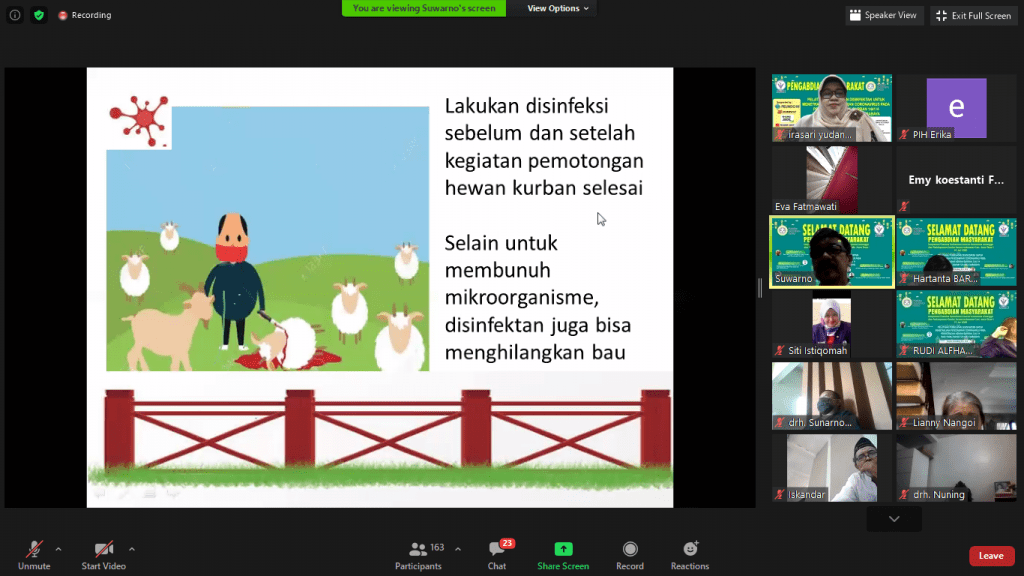The implementation of sacrificial worship on Eid al-Adha 1441 H this time has raised various concerns. The reason is that not a few are wary of being exposed to Covid-19 from sacrificial animals.

Responding to this, Prof. Dr. Suwarno, drh., M.Si. said that the risk of Covid-19 transmission through animals is very small. He conveyed this in the Faculty of Veterinary Medicine (FKH) UNAIR Community Service event entitled Training on Disinfectant Making to Neutralize Coronavirus Pollution in Qurban Animal Slaughter 1441 H for Pre Takmir in Surabaya City. Precisely on Sunday (07/19/2020) yesterday.
“Animals are not at risk of contracting or transmitting the coronavirus from people affected by Covid-19, but what is dangerous is transmission from people affected by Covid-19,” he explained in an event attended by more than 160 takmir from various cities in Indonesia.
Suwarno explained that basically the structure of animal cells does not match the coronavirus receptor. “Human cells are compatible with Covid-19 receptors, but animals are different. So this is what causes Covid-19 cannot be transmitted to animals,” explained the FKH UNAIR lecturer.
He emphasized that sacrificial animals are not likely to be an intermediary for Covid-19 transmission. According to him, what needs to be watched out for is human-to-human transmission. Therefore, he continued, the implementation of qurbani must implement health protocols.
“There is no transmission of Covid-19 from humans to animals or vice versa. What exists is human-to-human transmission. To avoid this, we must use PPE and implement health protocols. The sacrificial committee must be really selective in this regard,” he said.
On the same occasion, Head of the Department of Veterinary Clinic FKH UNAIR Prof. Dr. Wiwik Misaco Yuniarti, drh., M.Kes. made a similar statement. According to her, until now there is no scientific evidence that animals are the source of Covid-19 infection in humans.
Although there is no risk of transmitting Covid-19, Wiwik advised that the implementation of qurbani this time must maintain health protocols. Especially for sellers, slaughterers, and processors of qurban animals and meat distributors.
“Everything from waste, slaughtering process, cutting, to delivery must be treated differently from the previous year. The implementation this time must be done by implementing health protocols,” he said.
Wiwik continued, in essence, the things that must be considered are always doing physical distancing and personal hygiene. In addition, the qurbani committee must implement hygiene and sanitation at the place of sale and at the slaughterhouse, as well as conduct initial health checks, such as temperature checks for each committee.
“Let us together obey all existing regulations, so that we can carry out Eid al-Adha activities calmly, solemnly, and safely,” Wiwik ordered. (*)
Source: http://news.unair.ac.id/2020/07/20/pakar-hewan-kurban-tidak-berisiko-menularkan-covid-19/
Writer: Erika Eight Novanty
Editor: Feri Fenoria

